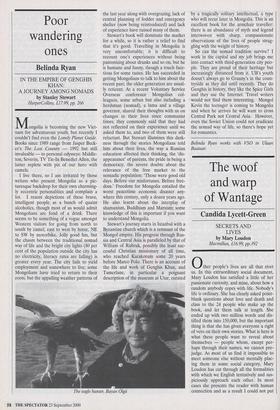Poor wandering ones
Belinda Ryan
IN THE EMPIRE OF GENGHIS KHAN: A JOURNEY AMONG NOMADS by Stanley Stewart HarperCollins, £17.99, pp. 266 Mongolia is becoming the new Viet- nam for adventurous youth, but recently I couldn't find even the Lonely Planet Guide. Books since 1989 range from Jasper Beck- er's The Lost Country — 1992 but still invaluable — to personal odysseys: Middle- ton, Severin, TV Tie-In Benedict Allen, the latter replete with pix of our hero with camels.
I live there, so I am irritated by those writers who present Mongolia as a pic- turesque backdrop for their own charming- ly eccentric personalities and complain a lot. I resent depictions of these brave, intelligent people. as a bunch of quaint alcoholics, though most of us would admit Mongolians are fond of a drink. There seems to be something of a vogue amongst Western visitors for going from north to south by camel, east to west by horse, NE to SW by motorbike. Jolly good fun, but the chasm between the traditional nomad way of life and the bright city lights (80 per cent of the population outside the city has no electricity, literacy rates are falling) is greater every year. The city fails to yield employment and somewhere to live; some Mongolians have tried to return to their roots, but the appalling weather patterns of the last year along with overgrazing, lack of central planning of fodder and emergency shelter (now being reintroduced) and lack of experience have ruined many of them.
Stewart's book will dominate the market for a while, so it is rather a relief to find that it's good. Travelling in Mongolia is very uncomfortable; it is difficult to recount one's experiences without being patronising about drunks and so on, but he is humane and funny, though a touch face- tious for some tastes. He has succeeded in getting Mongolians to talk to him about the recent past; the older generation are usual- ly reticent. At a recent Voluntary Service Overseas conference Mongolian col- leagues, some urban but also including a herdsman (nomad), a lama and a village governor, shared their thoughts with us on changes in their lives since communist times; they commonly said that they had not reflected on their experience until we asked them to, and two of them were still reluctant. But Stewart illumines this dark- ness through the stories Mongolians told him about their lives, the way a Russian education affected their thinking, the 'dis- appearance' of parents, the pride in being a democracy, the severe doubts about the relevance of the free market to the nomadic population: 'Those were good old days. Before our misfortunes. Before free- dom.' Freedom for Mongolia entailed the worst peacetime economic disaster any- where this century, only a dozen years ago. He also learnt about the interplay of shamanism, Buddhism and Marxism; some knowledge of this is important if you want to understand Mongolia.
Stewart's journey starts in Istanbul with a Byzantine church which is a remnant of the Mongol empire. His progress through Rus- sia and Central Asia is paralleled by that of William of Rubruk, possibly the least suc- cessful Christian missionary of all time, who reached Karakorum some 20 years before Marco Polo. There is an account of the life and work of Genghis Khan, and Tamerlane, in particular a poignant description of the museum at Utar, curated The eagle hunter, Bayan Olgii by a tragically solitary intellectual, a type who will recur later in Mongolia. This is an excellent book for the armchair traveller: there is an abundance of myth and legend interwoven with sharp, compassionate observations of the lives of people strug- gling with the weight of history.
So can the nomad tradition survive? I work in the capital and my job brings me into contact with third-generation city peo- ple. They are proud of their heritage but increasingly distanced from it. UB's youth doesn't always go to Granny's in the coun- tryside as they did until recently. They do Genghis in history, they like the Spice Girls and they use the Internet. Travel writers would not find them interesting. Mongol Kevin the teenager is coming to Mongolia and when he arrives he will want to cross Central Park not Central Asia. However, even the Soviet Union could not eradicate the nomad way of life, so there's hope yet for romantics.
Belinda Ryan works with VSO in Man Baataar.






















































































 Previous page
Previous page